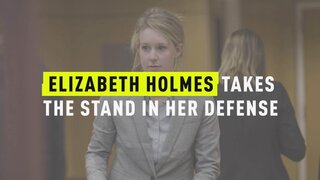Create a free profile to get unlimited access to exclusive videos, breaking news, sweepstakes, and more!
After Surprise Move To Take The Stand In Her Own Defense, Elizabeth Holmes Will Resume Testimony
Elizabeth Holmes, who is accused of defrauding investors of her healthcare company, testified for around an hour Friday afternoon but has yet to comment on many of the central aspects of the prosecution's case.

After months of listening to prosecutors lay out their case, Elizabeth Holmes took the stand herself Friday in a surprising move by the defense.
Holmes, who is facing nine counts of wire fraud and two counts of conspiracy to commit wire fraud after allegedly defrauding investors by making false promises about the capabilities of her blood testing company, testified for about an hour Friday before the court broke for the weekend, according to CNN.
Holmes, who has pleaded not guilty in the case, took the stand in the San Jose federal courtroom wearing a navy blazer and white blouse to present her side of the story, shortly after prosecutors had rested their case against the 37-year-old Friday morning.
Prosecutors presented months of testimony from 29 different witnesses, including scientists, retail executives and former employees, who supported the prosecution’s contention that Holmes had duped her investors and customers about Theranos’ technology and put patients at risk even though she knew the company was unable to deliver on its promises.
Although many legal experts predicted Holmes wouldn’t take the stand in her defense, she surprised many on Friday by taking the stand to discuss her time at Stanford University before dropping out of school at the age of 19 to begin what would later become Theranos, NPR reports.
Holmes spoke for around an hour about the company’s early days, years before prosecutors have said the alleged fraud began, testifying about how she recruited top talent to help her build the firm, including chemical engineering professor Channing Robertson and Silicon Valley venture capitalist Don Lucas, who would become an investor and chairman of the board.
She described the “very comprehensive diligence process” Lucas engaged in before joining the company, including speaking with some of the pharmaceutical companies Theranos had been working with at the time. The testimony seemingly refuted the prosecution’s claim that she had tried to hide information from her investors, according to The New York Times.
Yet, Holmes has yet to discuss key aspects of the prosecution’s case or her relationship with former boyfriend and Theranos CEO Sunny Balwani, who is facing his own criminal charges in connection with the alleged fraud.
Holmes ultimately raised $945 million from investors after claiming to have invented technology that could perform a range of medical tests using only a few drops of blood.
The discovery would have revolutionized the health care industry and did skyrocket Holmes to fame within Silicon Valley, even earning her the title of “the next Steve Jobs.”
Holmes even took to wearing signature black turtlenecks much like the Apple visionary—but unlike Apple, the groundbreaking technology could never be proven and the company began to fall apart when a Wall Street Journal reporter began delving deeper into the bold claims.
Miriam Baer, a law professor at Brooklyn Law School, told CNN that the decision to have Holmes take the stand could be part of the defense’s strategy to have the jury “meet the ‘real’ Elizabeth Holmes.”
“If Holmes paints herself as a ‘big ideas’ innovator who happened to be unaware of the company’s failures or misstatements, she can help her case—or at least sow doubt among several jurors,” Baer said. “And she can also help her case marginally if she appears more sympathetic or likeable than the person portrayed by the government’s witnesses.”
Yet, according to Stanford Law professor Robert Weisberg, the move could also carry some risk since prosecutors are likely to subject Holmes to a “really, really rigorous” cross-examination, the outlet reports.
Holmes defense team has suggested in its opening statements that they may try to put the blame onto Balwani, who they contend she had trusted too much, The Verge reports. Court documents filed in the case have also suggested that the defense team may try to paint Balwani as an abuser, who controlled Holmes by dictating what she wore and her communications with others.
Balwani—who is expected to go to trial at a later date—has denied the allegations against him.
Holmes is expected to return to the stand on Monday. If convicted, Holmes could be facing up to 20 years behind bars.






















